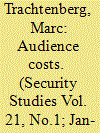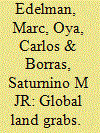|
|
|
Sort Order |
|
|
|
Items / Page
|
|
|
|
|
|
|
| Srl | Item |
| 1 |
ID:
111585


|
|
|
|
|
| Publication |
2012.
|
| Summary/Abstract |
This article examines the argument that the ability of a government to generate "audience costs"-to create a situation, that is, in which it would pay a domestic political price for backing down-plays a key role in determining how international crises run their course. It does this by looking at a dozen great power crises to see how well various aspects of the audience costs argument hold up in the light of the historical evidence. The audience costs mechanism, it turns out, does not play a major role in any of those crises-a conclusion which, the author claims, has certain important methodological implications.
|
|
|
|
|
|
|
|
|
|
|
|
|
|
|
|
| 2 |
ID:
124908


|
|
|
|
|
| Publication |
2013.
|
| Summary/Abstract |
Scholars, practitioners and activists generally agree that investor interest in land has climbed sharply, although they differ about what to call this phenomenon and how to analyse it. This introduction discusses several contested definitional, conceptual, methodological and political issues in the land grab debate. The initial 'making sense' period drew sweeping conclusions from large databases, rapid-appraisal fieldwork and local case studies. Today research examines financialisation of land, 'water grabbing', 'green grabbing' and grabbing for industrial and urbanisation projects, and a substantial literature challenges key assumptions of the early discussion (the emphasis on foreign actors in Africa and on food and biofuels production, the claim that local populations are inevitably displaced or negatively affected). The authors in this collection, representing a diversity of approaches and backgrounds, argue the need to move beyond the basic questions of the 'making sense' period of the debate and share a common commitment to connecting analyses of contemporary land grabbing to its historical antecedents and legal contexts and to longstanding agrarian political economy questions concerning forms of dispossession and accumulation, the role of labour and the impediments to the development of capitalism in agriculture. They call for more rigorous grounding of claims about impacts, for scrutiny of failed projects and for (re)examination of the longue durée, social differentiation, the agency of contending social classes and forms of grassroots resistance as key elements shaping agrarian outcomes.
|
|
|
|
|
|
|
|
|
|
|
|
|
|
|
|
|
|
|
|
|